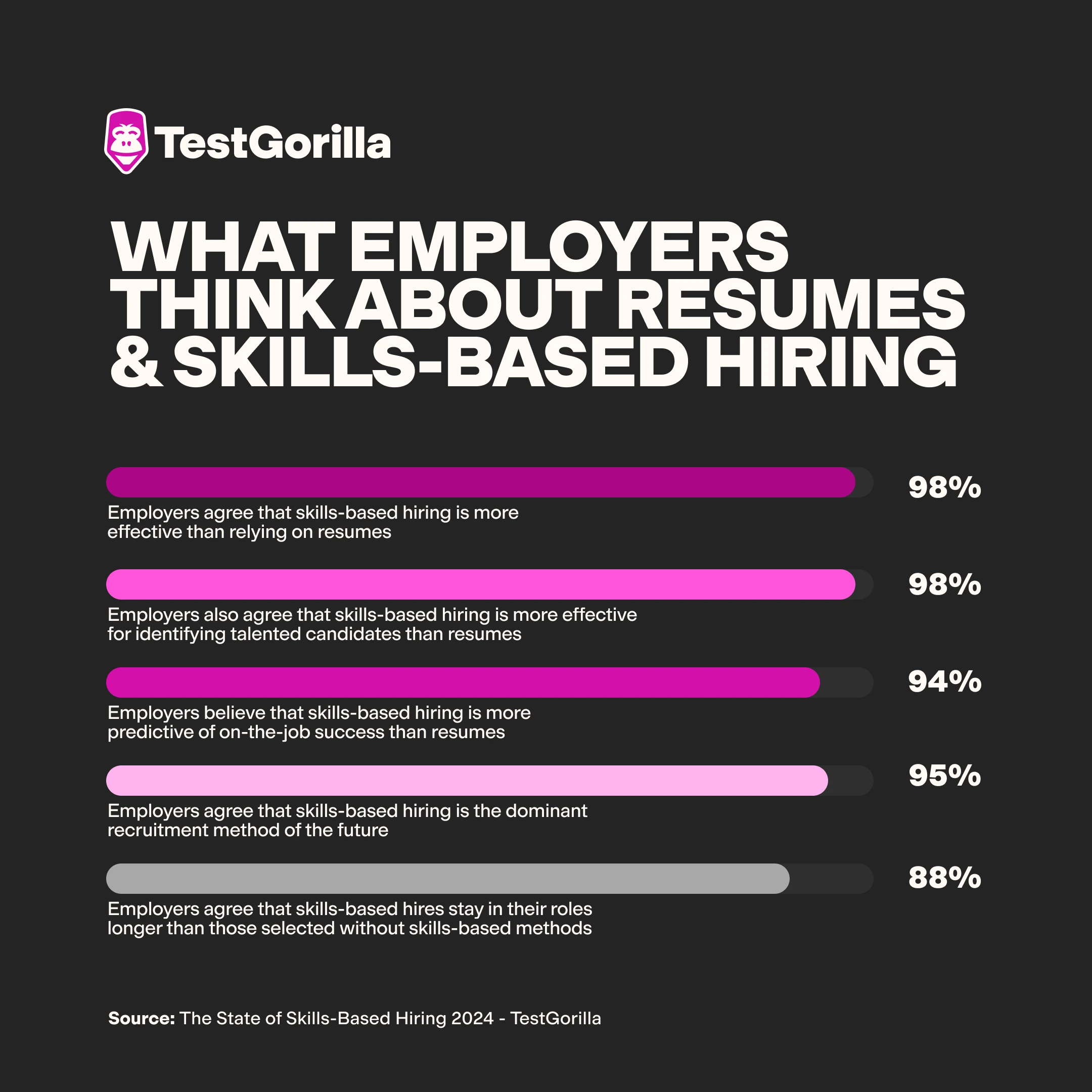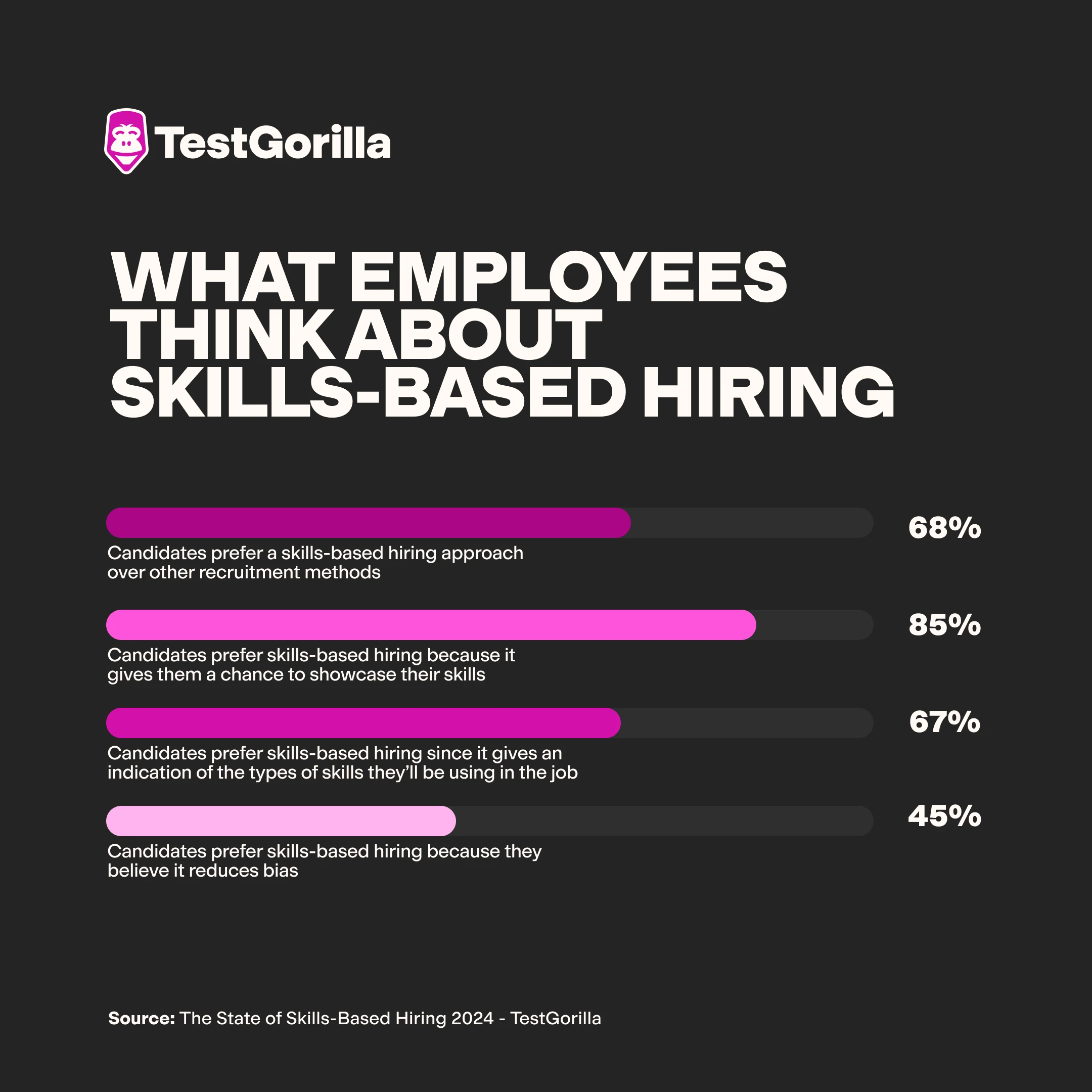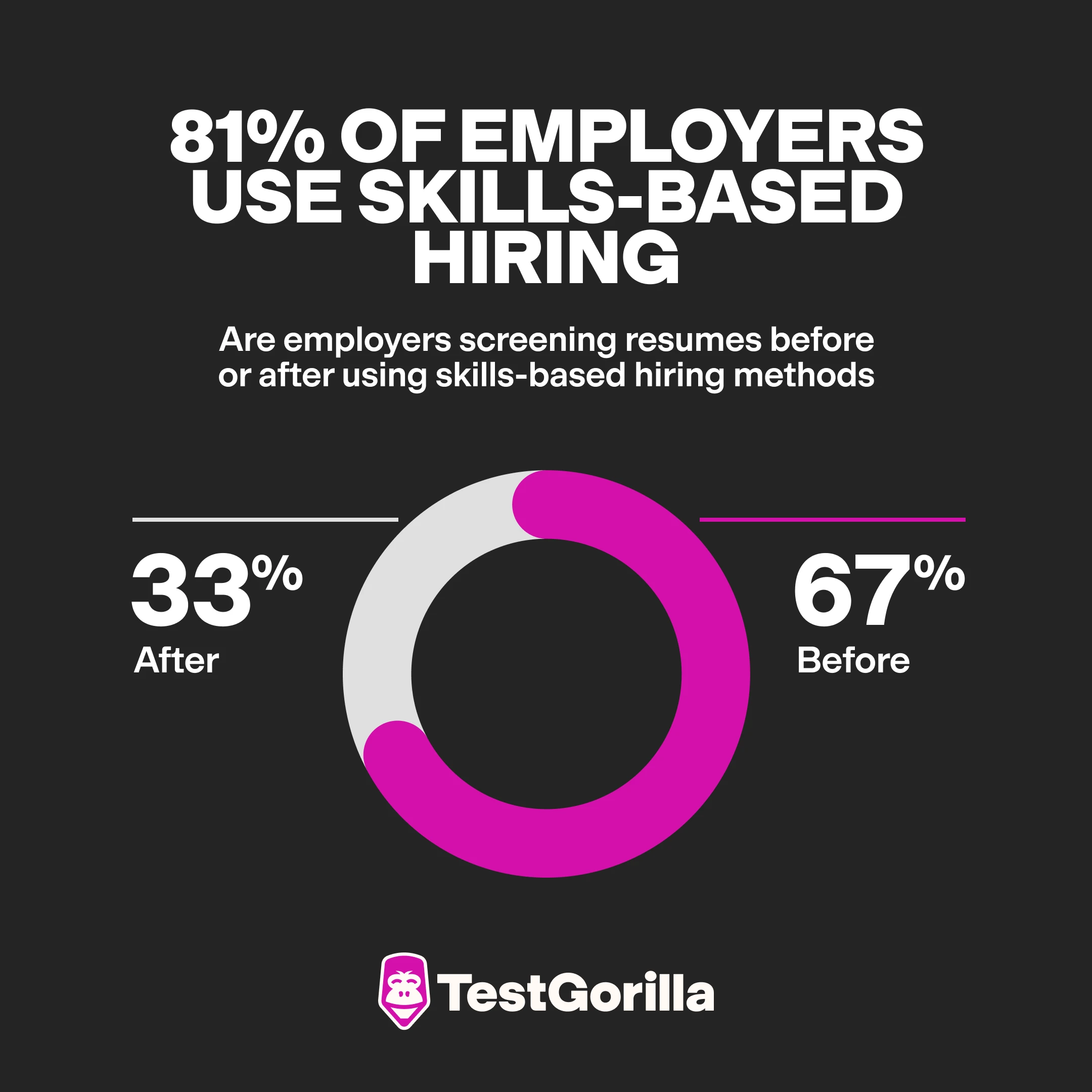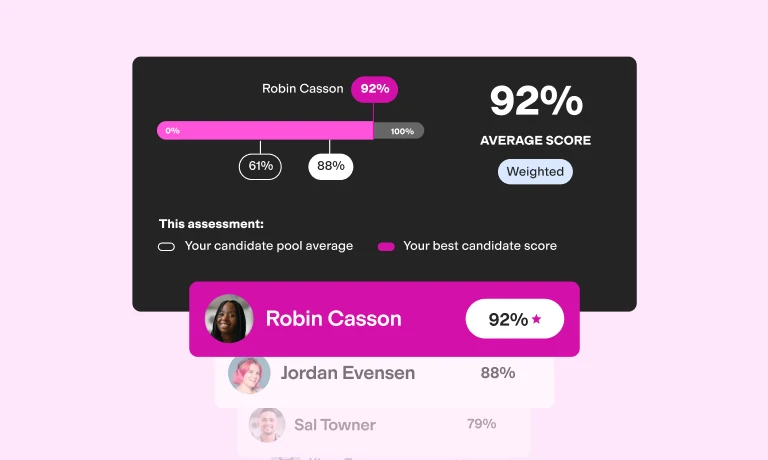Every year, we survey thousands employers and job seekers about hiring. This year we brought you The State of Skills-Based Hiring 2025, and he data paints a clear picture: Skills-based hiring is the primary recruitment method of the future, but employers are still using resume screening as part of their hiring processes.
So, what are the exact statistics about resumes, and will using resumes alongside skills-based methods work for you?
In this blog post, we’ve pulled specific data from our various annual reports to bring you 50 essential resume statistics. These stats should help you understand who's using resumes, what's working, and what's not.
Table of contents
- Key takeaways
- Statistics about employer attitudes towards resumes
- Statistics about employee attitudes to resumes
- Resume usage statistics
- Statistics about resumes and AI
- How long are job seekers spending on resumes?
- How long do recruiters spend screening them?
- Resumes are becoming more visual
- Read our report for more hiring stats
Key takeaways
The majority of employers agree that skills-based hiring is more effective than relying on resumes.
59% of employees feel they “have trouble standing out from the crowd” when submitting resumes in job applications – and this goes up to 61% for women.
A third of employers are screening resumes after they use other skills-based hiring methods, while two-thirds are screening resumes before they use skills-based hiring methods. The third that use skills-based hiring first are more satisfied with their hires.
Statistics about employer attitudes towards resumes
In 2025, 86% of US and 89% of UK employers report having problems with resumes. Overall, that means only 13% of employers aren't having issues with resumes.
Here's a breakdown of the kind of problems employers are encountering:
25% of employers said they receive too many resumes to read.
39% of employers said they found it difficult to rank candidates using resumes.
33% of employers said they struggled to determine an applicant’s skills from their resumes.
36% of employers said they struggled to determine whether the resumes of their applicants were accurate.
That said, our report also reveals that two-thirds (67%) of employers have used resumes in their hiring processes in the last 12 months.
This is despite the fact that 85% of employers are now using some form of skills-based hiring.
Skills-based hiring involves replacing – or supplementing – traditional recruitment methods with methods that can help you understand the true nature of a candidate’s skills. For instance, instead of relying on resume screening alone, you might supplement this tool with skills-based tests that assess candidate’s skills. Or, instead of requiring a certain degree or level of experience for a role, you might instead ask for a portfolio of work and an on-the-job trial period.
Though one third of employers are not using them, resumes are still in the picture – even for employers who do skills-based hiring.
Here’s what our 2024 report revealed about resumes and skills-based hiring:
98% of employers agree that skills-based hiring is more effective than relying on resumes.
98% of employers also agree that skills-based hiring is more effective for identifying talented candidates than resumes.
94% of employers believe that skills-based hiring is more predictive of on-the-job success than resumes.
95% of employers agree that skills-based hiring is the dominant recruitment method of the future (this means this method is taking the resume’s once-almighty place).
88% of employers agree that skills-based hires stay in their roles longer than those selected without skills-based methods (such as those hired based on their resumes alone).
The best insights on HR and recruitment, delivered to your inbox.
Biweekly updates. No spam. Unsubscribe any time.
Statistics about employee attitudes to resumes
Our 2023 survey revealed that employees, like employers, were also growing increasingly disillusioned with resumes:
42% of employees stated that they had trouble “standing out from the crowd” when submitting resumes
57% of those respondents were women
Now, compare this with what employees had to say about skills-based hiring in our 2024 report:
68% of candidates prefer a skills-based hiring approach over other recruitment methods (like resumes) – an increase of 12% from last year’s survey.
85% of these candidates say they prefer skills-based hiring because it gives them a chance to showcase their skills.
67% prefer skills-based hiring since it gives an indication of the types of skills they’ll be using in the job.
45% prefer skills-based hiring because they believe it reduces bias.
The last point is important. Hiring bias is only going up – 42% of job seekers report experiencing it in 2025, compared to 31% in 2024 and 21% in 2024.
Employers that use resumes as a sole screening tool don’t give employees a fair chance to showcase their true skills, and employees know this. This is why employees are increasingly preferring skills-based hiring methods that give them a chance to show what they can do – including skills-based assessments that enable them to prove they possess the skills needed for the role.
Resume usage statistics
82% of employers had used resumes to hire in the past 12 months
88% of employees had submitted resumes as part of the hiring process
55% of employers were using resumes to validate their applicants’ hard skills
39% of employers were using resumes to validate their applicants’ soft skills
Fast forward to 2024, where 81% of employers are using skills-based hiring (this figure was 73% in 2023). In 2025, our report data shows 85% are now using skills-based hiring.
Here are some stats focused on employers who use skills-based hiring alongside resumes:
33% of employers are screening resumes after using skills-based hiring methods.
67% of employers are screening resumes before using skills-based hiring methods.
The 33% who use skills-based hiring methods before screening resumes are happier with their hires.
Employers who use skills tests before screening resumes are more likely to make quality hires (96% vs. 87%).
The takeaway? Screen resumes after assessing skills. This reduces any hiring bias that might otherwise creep in during the resume screening process, like favoring a candidate because they went to a noteworthy school even if they don’t possess the skills the role demands. Plus, you’re likely to be happier with your hires.
Statistics about resumes and AI
In our 2025 report, we asked employers and job seekers questions about how they're using AI in the hiring process. Here's what we found:
65% of employers are using AI in the hiring process. This goes up to 70% for US employers, and down to 60.5% for UK employers.
3 in 5 employers are using AI to write job descriptions
59% of employers are using AI to screen resumes
94% of the employers who are using AI in the hiring process say it’s brought improvements
73% say they've noticed more AI-generated resumes
70% of employers say AI-generated resumes are easy to spot
How do employers feel about seeing more AI-generated resumes? It's mixed:
A survey of 3,000 hiring managers by resume.io found that 49% of them reject applicants for using AI-generated resumes.
In contrast, an MIT Sloan study found that resumes boosted by AI were 8% more likely to be selected for an interview, and these applicants were offered 8.4% higher wages than those who did not use AI in their resume.
But whilst lots of employers are reporting more AI-generated resumes, job seekers are using it less than they might think. Whilst job seekers still spend hours preparing their resumes – even with GenAI in the picture – employers spend little time screening them:
37% of job seekers say they are using AI to complete job applications
To learn how to best navigate this, read our article about the good, bad, and ugly of AI-generated resumes.
How long are job seekers spending on resumes?
According to our 2025 report, 55% of job seekers are still spending between 1 and 3 hours preparing their applications, with only 18% spending less than an hour
Other sources have different findings:
Optim Careers, a company that mentors job seekers, states that it takes the average person over 30 hours per week to write and update their resume. This is because resume writing is a very particular genre of writing, and resumes must be continually tailored to each job a job seeker applies for. The more knowledge someone has of this genre, the less time they’ll spend writing.
Meanwhile, Zety has analyzed over 11 million resumes created with its resume builder and found that resumes took, on average, just 15.25 minutes to create. This shows the power of tech in speeding up the process.
AI tools like ChatGPT can generate complete resumes in minutes or less. For example, we asked ChatGPT to generate a full resume for an R&D engineer, and it took just 31.4 seconds.
How long do recruiters spend screening them?
TestGorilla's data shows that:
71% of employers spend less than 15 minutes reviewing a resume
A quarter of them spend less than 5 minutes
But how do they actually spend this time? A 2024 survey of hiring managers and recruiters conducted by ResumeGo asked them how they spend their time when they're reviewing resumes. Here's what they said:
42% of respondents almost always skim resumes instead of reading them line by line.
Compare this with the 2% and 3% that rarely or almost never do, respectively.
24% of respondents say that they reject 81-100% of resumes before they fully finish reviewing them.
Just 8% of respondents fully finish reviewing 0-20% of resumes before rejecting them.
While these stats are certainly understandable given the time constraints and other pressures hiring managers and recruiters face, we worry that some highly qualified applicants might fall through the cracks simply because their resumes didn’t fully demonstrate their skills or potential – or weren’t easy to skim.
This is something using skills-based assessments before resume screening can fix, as many skills-based assessment platforms – like TestGorilla – automatically score candidates for users. This means that you can understand the true breadth of your candidates’ skills before you look at their resumes – and skimming assessment scores is so much easier than skimming resumes.
Resumes are becoming more visual
A Forbes article showed that 71% of hiring managers believe that purely text-based resumes will be obsolete within five years.
Meanwhile, 60% of these hiring managers prefer visual elements in resumes.
These stats make us worry that employers using resume screening – especially before skills-based hiring – will start favoring candidates with better design skills, even if the job doesn’t require design skills. Imagine picking a candidate for a financial analyst position simply because their resume looked better than other candidates’ – what if those other candidates possessed stronger job-specific skills?
This is another reason why resume screening after assessing candidates for their skills is so important.
Read our report for more hiring stats
Resume screening is no longer the primary recruitment tool: Skills-based hiring has taken over as the dominant recruitment method of the future. While many employers continue to use resume screening, statistics show that those using it after other skills-based hiring methods are happier with their hires. And employees prefer skills-based hiring over resumes.
To read more stats, check out The State of Skills-Based Hiring 2025.
Want more stats? Then consider checking out 47 skills-based hiring statistics.
You've scrolled this far
Why not try TestGorilla for free, and see what happens when you put skills first.





















